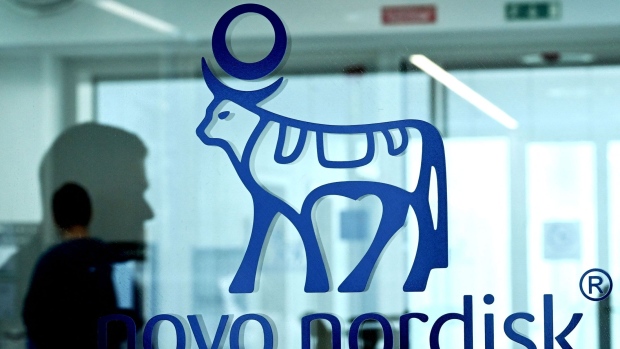Mar 7, 2024
Novo Nordisk Surges to Record on Experimental Obesity Pill Data
, Bloomberg News

(Bloomberg) -- Novo Nordisk A/S touted the potential of its next-generation obesity treatments, releasing promising data on an experimental daily pill and sending the shares soaring to a record.
A new treatment called amycretin, which targets two modes of action against obesity including GLP-1, like the blockbuster injection Wegovy, helped patients shed 13% of their weight over 12 weeks in an early-stage test. The early-stage results suggest the pill may be even more effective than Novo’s Wegovy injection.
Never miss an episode. Follow the Big Take podcast on iHeart, Apple Podcasts, Spotify or wherever you listen. Read the transcript.
The study was small but Novo said in a meeting with investors that it provides a basis for further development of the pill, boosting hopes for its future. The stock rose as much as 8.3% in Copenhagen, extending the past year’s 68% gain.
Novo’s next-generation projects are key as the Danish drugmaker attempts to keep the lead in the growing market for obesity treatments. The success of Wegovy and its sister drug Ozempic has turned Novo into Europe’s biggest publicly traded company and the 12th largest worldwide, and Thursday’s share gain boosted its market value above $600 billion.
The 13% weight loss in Novo’s amycretin trial was better than what was shown by a competing experimental pill from rival Eli Lilly & Co., Emily Field, an analyst at Barclays, said in a note to investors.
Novo is moving quickly on the compound, she noted, with management saying it wouldn’t rule out jumping straight to a final-stage trial, the kind that could be the basis for regulatory approval. Lilly shares fell 2% at the New York market open.
Shares of other obesity drug developers also fell. Viking Therapeutics Inc. plunged as much as 20%, while Structure Therapeutics Inc. lost as much as 9%, the most since December. Amgen Inc. dipped 1.2%.
Novo got a further boost when the US health insurer Cigna Group said Thursday that it has agreements with the drugmaker and rival Eli Lilly & Co. aimed at widening coverage of obesity drugs. Cigna’s offering to US employers would limit how much their health plans would pay for the drugs and keep spending increases on them to a maximum of 15% annually.
Novo Chief Executive Officer Lars Fruergaard Jorgensen, speaking at the start of a day-long event about strategy and research, described the obesity market as “a tremendous runway.”
Novo has struggled to meet demand for Ozempic and Wegovy, despite list prices exceeding $1,000 a month. The company has pushed to boost production, agreeing last month to pay $11 billion for three factories from drug supplier Catalent Inc.
A large study showing that Wegovy cut the risk of heart attacks and strokes in patients with obesity will help as Novo negotiates with insurers, the company said.
The drug was as much as twice as cost effective in patients like those in the heart-disease trial, said Camilla Sylvest, Novo’s chief of commercial strategy and corporate affairs. “That means we have a great starting point for having discussions with payers,” she said.
$80 Billion Market
Novo is also facing its first competition, Lilly’s Zepbound, after having the market for potent weight-loss shots to itself for more than two years. Other competitors are on the horizon, though Bloomberg Intelligence predicts Novo and Lilly will dominate an $80 billion market for obesity medicines by 2030.
Closest to reaching patients is a Novo shot called CagriSema, which combines the medicine in Wegovy with another compound for weight loss. The pill in early-stage trials uses the same approach in a single tablet, and Novo is studying that compound as a shot as well.
“This is a very competitive profile,” said Marcus Schindler, Novo’s chief of research and early development. This is the first time the company has combined the two entities into a single molecule, he said.
--With assistance from Christian Wienberg, John Tozzi, Jonas Ekblom and Michael Msika.
(Updates shares at US market open starting in third paragraph)
©2024 Bloomberg L.P.


